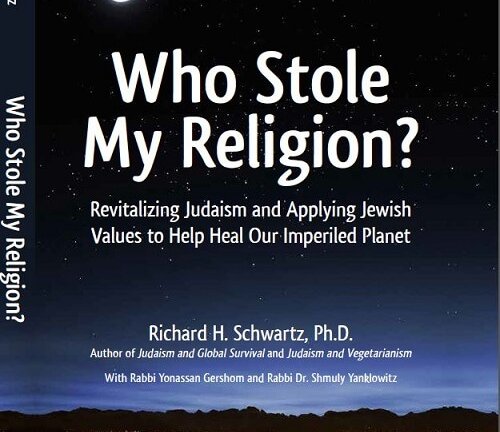Catastrophic climate change. Major food and water shortages. Species extinction.
Even though our planet is beset by “existential crises,” writes Dr. Richard H. Schwartz in Who Stole My Religion?, we can realign the balance. The subtitle of his new book explains how: Revitalizing Judaism and Applying Jewish Values to Help Heal Our Imperiled Planet.
“Many Jews have forgotten the Jewish mandate to strive to perfect the world,” Schwartz writes. “God requires that we pursue justice and peace, and that we exhibit compassion and loving kindness.”
These values are at the core of “Judaism and Animal Rights,” one of several chapters that will hold special interest for PETA Prime readers.
The Torah, the written law of Judaism, teaches that animals are part of God’s creation and that humans are their guardians. But one of its foundational tenets—that “we are forbidden to be cruel to animals”—has been overlooked, in part because many Jews may not realize how animals are abused every day.
To illustrate that point, Schwartz indicts the meat, dairy, and egg industries; details the suffering of those who are trapped for their fur; condemns the use of animals in experiments and for entertainment; and decries hunting as well as horse and dog racing.
But he doesn’t just present his case for readers to take or leave—he draws on the Bible to bolster his call for compassion and kindness. “In Judaism, one who is cruel to animals cannot be regarded as a righteous individual,” he writes.
To live in accord with the tenets of Jewish teachings, he adds, “Jews should seriously consider becoming vegetarians, and preferably vegans.”
Schwartz, the author of Judaism and Vegetarianism and a self-described “vegan activist” of more than three decades, elaborates on the other benefits of plant-based eating in the chapter titled “Should Jews Be Vegetarians—or Even Vegans?”
Deuteronomy 4:9 decrees that we should preserve our health and lives, but science has linked animal-based diets to heart disease, strokes, cancer, and other chronic, degenerative conditions. Psalm 24:1 teaches that “the earth is the Lord’s,” yet animal agriculture contributes to climate change, air and water pollution, and soil erosion and depletion.
“Animal-centered diets violate and contradict each of these important Jewish mandates,” he writes.
And in “Should Jews Be Environmental Activists?” he wonders what God, who created the world, must think of the damage humans have done to it.
Schwartz doesn’t focus solely on animal-centric issues. He also argues forcefully and passionately that justice, peace, compassion, and kindness are needed to address many of the world’s other ills—among them, religious extremism and an unjust economy.
He also says that the lost values he laments aren’t exclusive to the Jewish community.
Who Stole My Religion? is “meant to be a wake-up call.”
It is—for all of us.
PETA is a participant in the Amazon Services LLC Associates Program, an affiliate advertising program designed to provide a means for sites to earn advertising fees by advertising and linking to Amazon.com.
Written by Craig Shapiro






